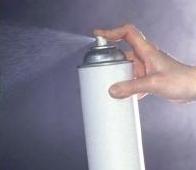 Parabens
and Aluminum are common ingredients in cosmetics particularly deodorants.
In the laboratory these can stimulate breast
and uterus cancer cells. This stimulation causes them to grow faster and become
more aggressive. Two clinical studies
have demonstrated greater quantities of parabens and aluminum in the outer upper part of the
breast (near the arm pit) in regular users of deodorants.
Parabens
and Aluminum are common ingredients in cosmetics particularly deodorants.
In the laboratory these can stimulate breast
and uterus cancer cells. This stimulation causes them to grow faster and become
more aggressive. Two clinical studies
have demonstrated greater quantities of parabens and aluminum in the outer upper part of the
breast (near the arm pit) in regular users of deodorants.
Although there is no direct evidence that these can
contribute to the risk of breast or uterus cancer many people are understandably concerned
that their regular use over long periods of time could be harmful. Of course we are are constantly
surrounded similar chemicals, collectively called xenoestrogens
and other carcinogenic chemicals so the risk has to be put in perspective with
other lifestyle factors.
Other sources of xenoestrogens
- Pesticides, herbicides and fertilizers
- Car pollution,
- Some deodorants - the parabens and aluminium.
- Polychlorinated biphenyls PCB’s,
- Fuels,
- Polycarbonate plastic bottles including babies bottles
- Food containers.
- Plastic film
More details It is difficult to avoid these chemicals in a modern environment and as they
are ingested in small quantities over long periods of time, many researchers
feel they could contribute to some of the hormone effects which are becoming
more common in humans. Dr. Devra Lee Davis, a toxicologist, and researchers from
five other USA academics centres demonstrated that if the same estrogenic
pollutants in our environment are given in higher quantities to laboratory mice,
they induce and promote mammary cancers. A further study in 1993 showed that
rhesus monkeys developed a thickened uterus (the first stages to develop cancer)
and endometriosis after being fed food that contained dioxin, a xenoestrogen,
over a four-year period. A fact worth noting is that 70 years ago, when the
environment was free of estrogenic pollutants, there were only 21 reported cases
of endometriosis versus the current 5.5 million in North America alone. Both
endocrinologists (specialists in disorders of endocrine glands such as ovaries
and testes) and reproductive biologists have suggested that long-term exposure
to xenoestrogens might underlie the rise in endometriosis, fibroids, infertility
and breast cancer in women. In men, many scientists believe that estrogenic
pollutants underlie some disturbing trends such as decreasing sperm count and
function, decreasing testosterone production and rise in the rate of testicular
cancer.
Further information: Your doctors
and specialist nurses are in an ideal position to give information relevant
to your situation. Macmillan
has a help line and a prize
winning video available in English UK
ethnic languages explaining Radiotherapy &
Chemotherapy. Cancernet.co.uk is a
complete cancer information resource written by an experienced team of doctors, health professionals and patients.
It will help you make informed decisions and guide you through the cancer journey
including information about:
The optimum treatment of specific cancers: Breast
| Prostate
| Bowel
| Other cancers. Common treatments:
Chemotherapy
| Radiotherapy |
Hormones |
Biological
agents | Complementary.
Lifestyle and cancer: Books based on the facts |
Exercise |
Diet |
Smoking |
Sun
exposure | Alcohol
Tip to help you cope with the symptoms of cancer and side
effects of treatments. Financial issues:
Traveling
and cancer
| Travel
insurance
Links
to support
groups | Books | Videos
| Glossary
| About
us | Disclaimer. Tests
for cancer | Clinical
trials | What
is cancer
| How to avoid cancer
 Parabens
and Aluminum are common ingredients in cosmetics particularly deodorants.
In the laboratory these can stimulate breast
and uterus cancer cells. This stimulation causes them to grow faster and become
more aggressive. Two clinical studies
have demonstrated greater quantities of parabens and aluminum in the outer upper part of the
breast (near the arm pit) in regular users of deodorants.
Parabens
and Aluminum are common ingredients in cosmetics particularly deodorants.
In the laboratory these can stimulate breast
and uterus cancer cells. This stimulation causes them to grow faster and become
more aggressive. Two clinical studies
have demonstrated greater quantities of parabens and aluminum in the outer upper part of the
breast (near the arm pit) in regular users of deodorants.